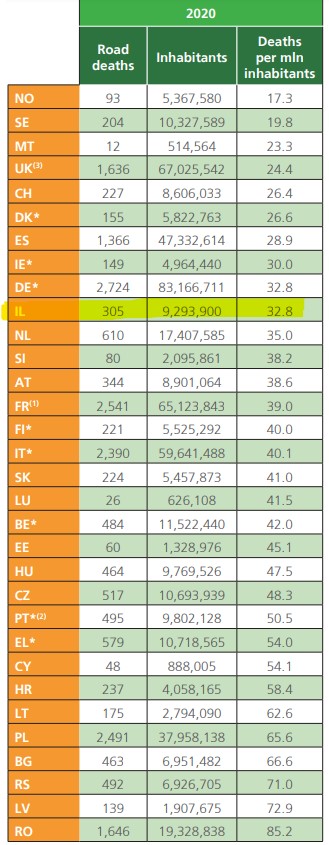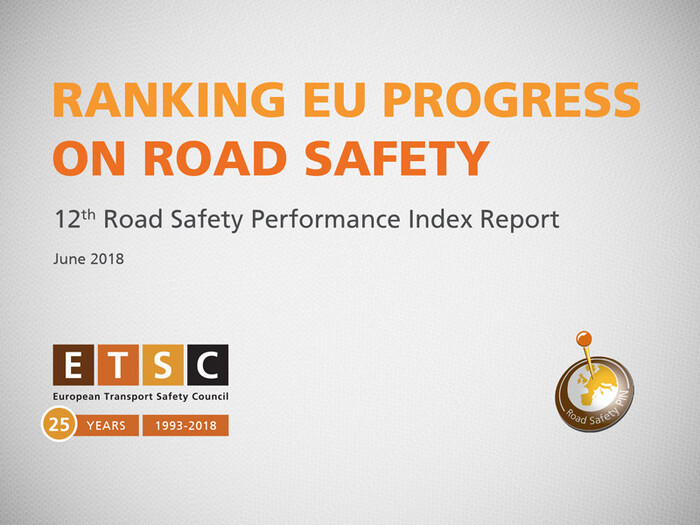A Guardian article by Bethan McKernan and Maria Rashed (“Israel grapples with ‘systemic problem’ of fatal road crashes”, Aug. 28) opened by noting recent road deaths in Israel, which, it argued, illustrated the country’s poor record in the area of road fatalties.
In most of the world, increasing vehicle use has led to more crashes, but a decrease in serious injuries and deaths, as car and road safety continuously improves. In Israel, however, according to a recent European Transport Safety Council report, there has been only a 4.7% drop in fatalities in the last decade, compared to 31% on average.
…
“Compared to Europe, or other developed countries, we are in very bad shape. What we have seen this week isn’t just bad luck, it’s a systemic problem,” [Avi Naor, chair of Israel’s National Road Safety Authority] said.
In fact, the Guardian’s selective statistics, and the one quote by Avi Naor, obscure the fact that, in contrast to the desired narrative, Israel’s road fatality figures compared favorably to those of Europe. The organisation the Guardian cites, the European Transport Safety Council, published data for 2020 showing that, in analysing road deaths per one million residents, Israel, at 32.8, ranks 10th best among 32 EU countries ranked, and is considerably better than the EU average of 42.3.

![]()
So, while, as the Guardian says, Israel has reduced their road deaths at a lower rate than other countries, the Israeli figure itself – as the bottom of the graph makes clear – is still considerably better than other countries.
Further data undermining the Guardian narrative is revealed in a 2019 report on road deaths per 100,000 residents by The International Transport Forum (ITF), an inter-governmental organisation within the OECD, which said:
The number of traffic deaths per 100,000 inhabitants in Israel fell by 51% between 2000 and 2019, from 7.9 to 3.9 traffic deaths per 100,000 inhabitants. By way of comparison, the average in the European Union was 5.1 deaths per 100,000 inhabitants in 2019.
Additionally, data in 2018 by WHO, cited by the Jerusalem Post this year, on traffic deaths per 100,000 people on the road, also testifies to Israel’s good record on road fatalties compared to other countries.
According to World Health Organization data from 2018, Israel has one of the best traffic records in the Middle East, with an average of 4.2 deaths per 100,000 people on the road. These numbers are on par with countries such as Canada, Japan and Norway and significantly lower than Jordan, Egypt and the United States.
The Guardian then turns to the disproportionate number of Arab citizens killed in Israeli road accidents.
Despite making up just 20% of Israel’s population, the country’s Arab minority are disproportionately affected: according to Israeli police statistics, Arab Israelis are involved in 52% of fatal crashes.
Ghassan Abofaneh, from Kafr Qara in Israel’s cluster of working-class, Arab-majority towns and villages, lost his 22-year-old cousin, Moneeb Mohammed, after his motorcycle collided with a car on Wednesday. He also lost two nephews, both in their early 20s, in a crash last June.
“It’s not just the bad infrastructure in Arab communities compared to Jewish ones. The problem goes much deeper than that,” said Abofaneh, 58.
“Young men drive fast anyway. Here, with no outlets to release stress, economic problems … Arab youth don’t ride motorcycles as a means of transport, but for adventure. All they care about is speed.
“These young men don’t have a place in society. We are 20% of the population but we are the ones dying in crashes because the government doesn’t care.”
As is so often the case in their reports about the region, the Guardian journalists cite largely anectodal evidence to back up their general assumption that any disparity in outcomes between Jews and Arabs in Israel must be explained by racism. However, an in depth 2020 study on the very questio regarding the disparities between Arabs and Jews in traffic deaths, by Israel Journal of Health Policy Research (IJHPR), tells a more nuanced story:
There are reports that Arabs have higher rates of unsafe road behaviors and noncompliance with traffic signs and regulations, including speeding, failure to maintain driving distance, making wrong turns, driving without using seatbelts, and not using child restraints [13, 18,19,20,21]. In addition, the road infrastructure in many Arab towns and villages is often considered to be of low quality, including narrow roads, lack of sidewalks and pedestrian crossings and visibility obstacles [13, 19, 20, 22]. In comparison to the general society, the Arab population in Israel is younger, has a delayed age of enrollment to preschool, has a larger family size, and has a lower socio-economic status (SES) [13, 16, 19, 22, 23]. All these factors may increase their risk of involvement in RTA, particularly in severe accidents that can lead to severe injuries and death [20, 21]. For example, young road users are more likely to engage in risky behaviors than their older counterparts, such as speeding, driving under the influence of alcohol, and not using helmets or seat belts, all of which may increase their risk of injury or death [24]. Low SES may be associated with less developed road infrastructure, risky road safety behaviors and use of vehicles that are not road worthy, all of which are reported to increase the risk of involvement in RTA [20, 25, 26].
So, while the low quality of road infrastructure in many Arab towns is cited as one possible reason for the disparity, higher Arab rates of “unsafe road behaviors” is empahsized as a more prominent factor.
With regard to both Israel’s overall record on traffic deaths compared to other countries and the specific issue of the deaths of Arab citizens of Israel on the country’s roads, it’s clear that the Guardian journalists who wrote the story simply didn’t do due dilligence – prefering to promote the desired Guardian narrative rather than engaging in anything resembling real journalism.
Related Posts
CAMERA UK co-editor to speak at London antisemitism conference





Bethan McKernan – a well known UK journalist who used Israeli restaurants, particularly in Emek Refaim in Jerusalem, as her office to contact her Arab staffers for information and write her anti Israeli diatribe, would be better off to drive on Israel’s major highways and the streets of Jerusalem and note who is the major culprit for disobeying the Highways Laws.
Yes it really is the Arab drivers who don’t obey the law as they think they own the country. Many of them are young, because compared to Jewish drivers of the same age the latter serve in the army and do not have either the time or finances like the Arabs to indulge their fantasies and reckless behavior!
Adam could also explore traffic fatality death rates relative to population density. Norway (best in list) has half Israel’s population in a territory 20 times the land mass. Is Israel’s fatality rate lower per person per square mile?